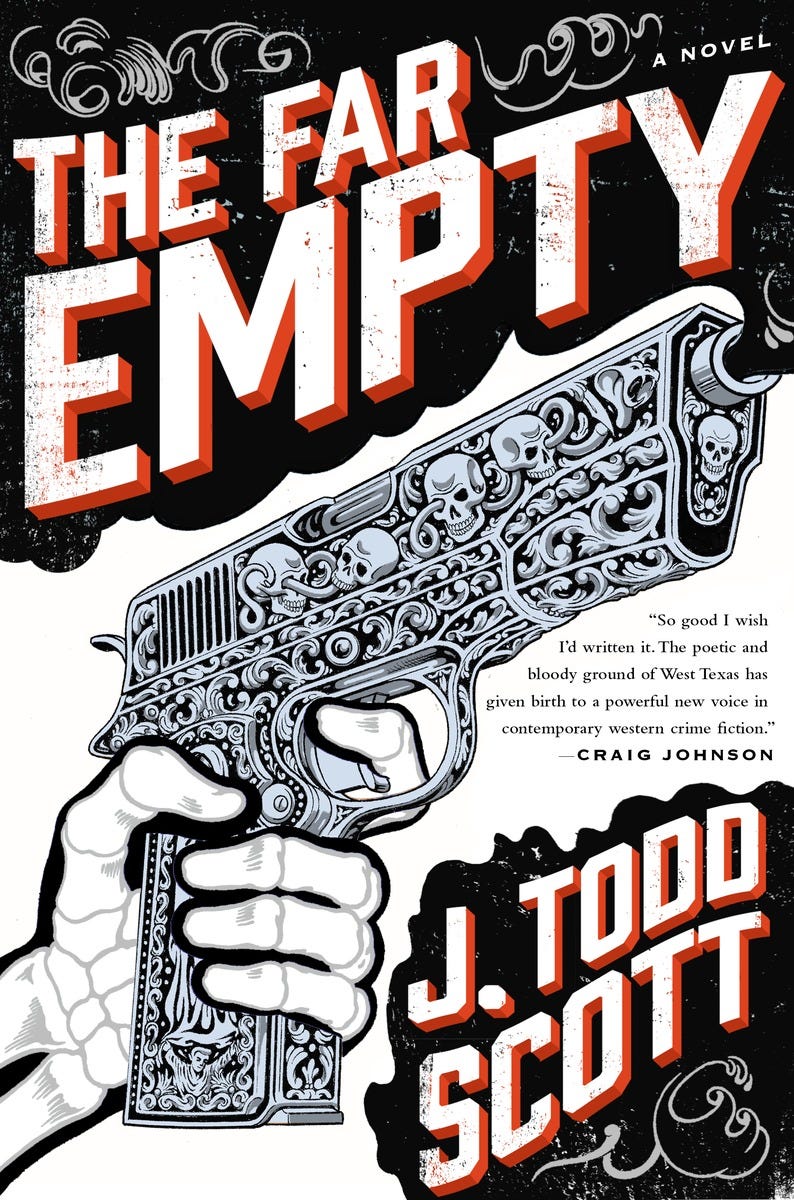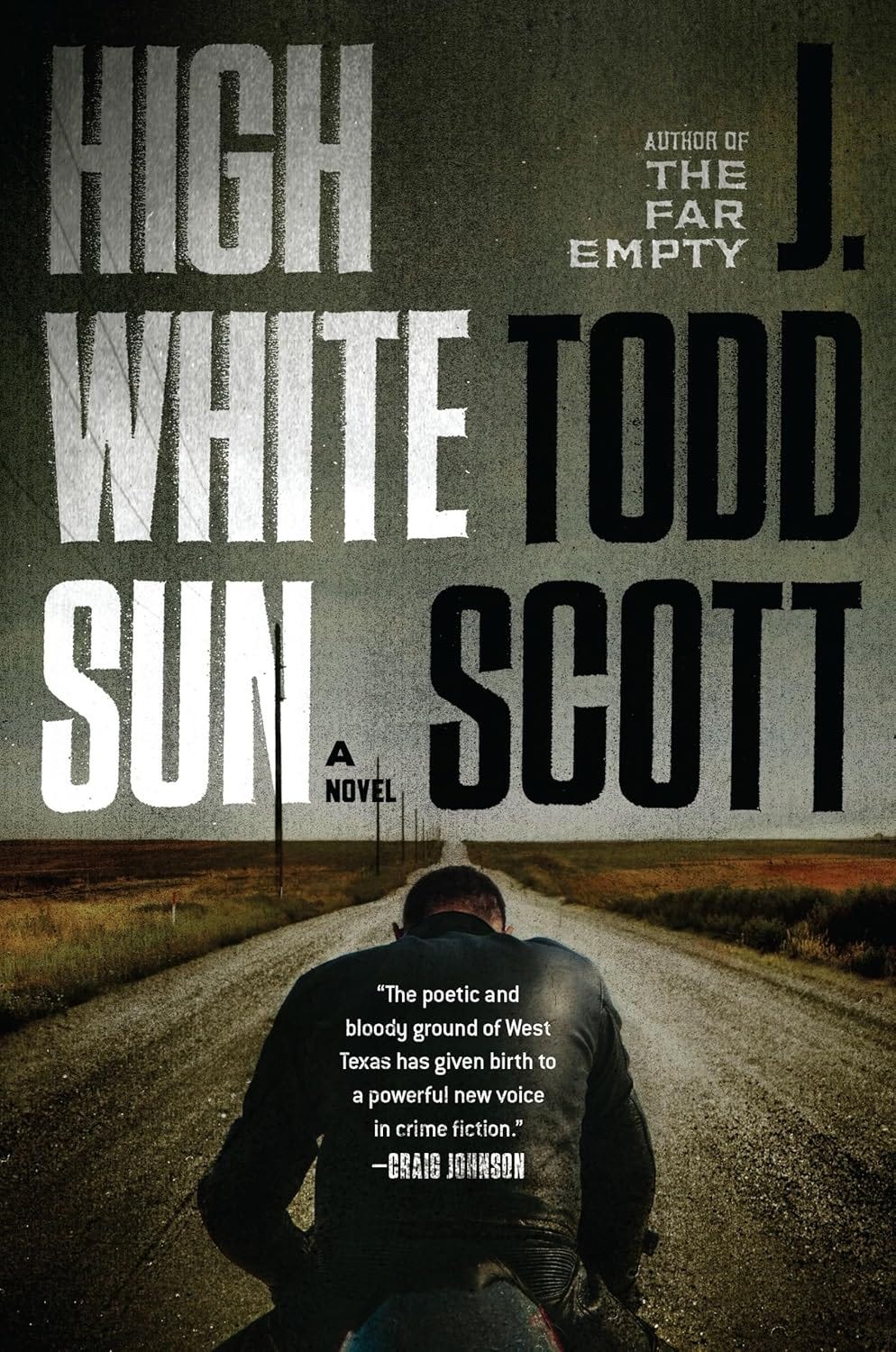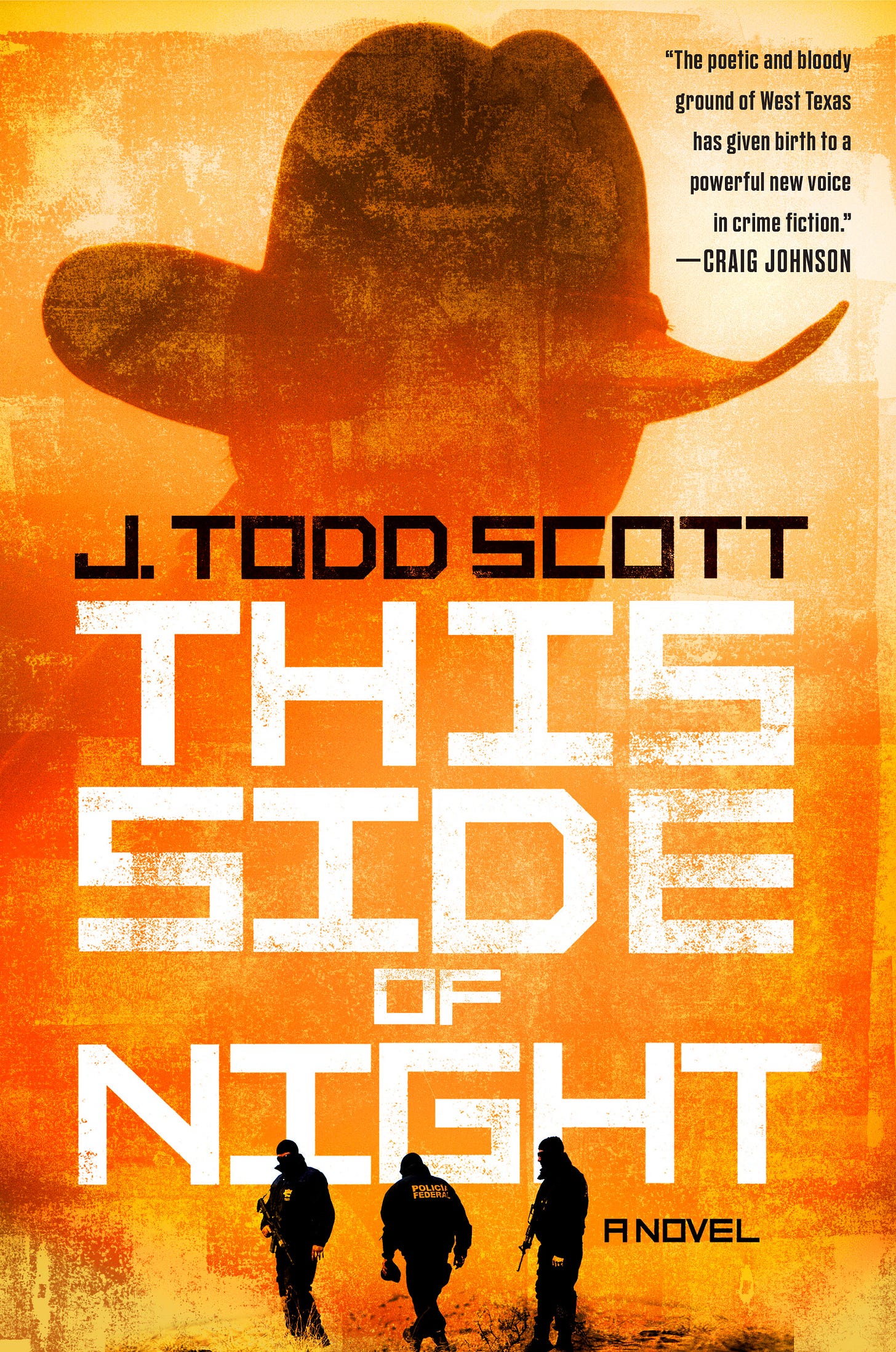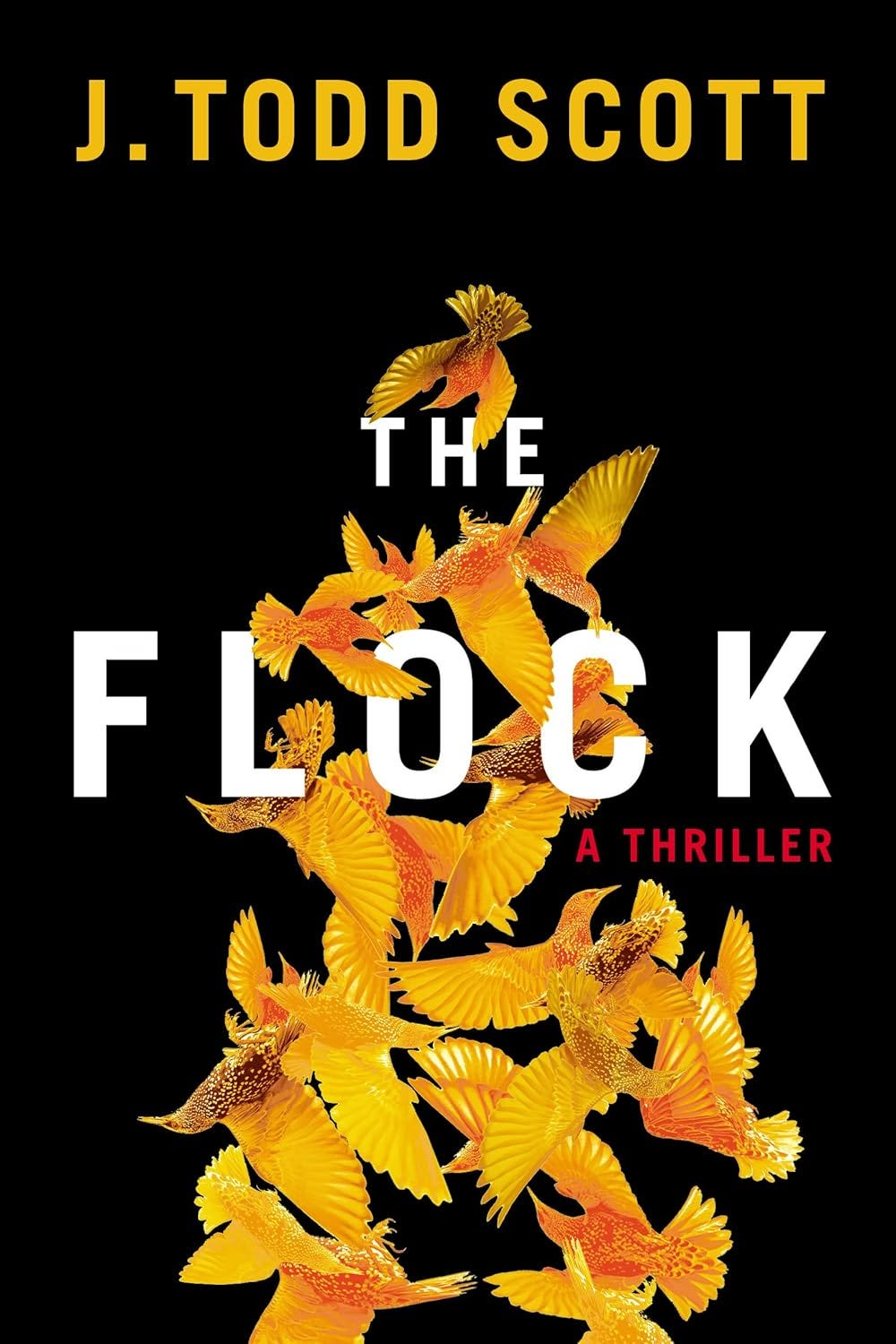I hope everyone had a great Thanksgiving.
I did, but beyond the food, fun, and football, I also worked—I was on a deadline to get revisions in for the book I recently sold, so I spent some of the holiday glued to my computer, and that got me to thinking about all the books I’ve published to date, enough (I think) to legitimately qualify as a “body of work,” whatever that mean. And while I don’t often push my own writing here, books do make a helluva Christmas present, and I’d like to believe a few of these are pretty good.
So, here’s a bit of a retrospective on how these books came to be…
My debut, and the first book in what became my Big Bend/Chris Cherry trilogy. Here’s the ad copy:
In this gritty crime debut set in the stark Texas borderlands, an unearthed skeleton will throw a small town into violent turmoil.
Seventeen-year-old Caleb Ross is adrift in the wake of the sudden disappearance of his mother more than a year ago, and is struggling to find his way out of the small Texas border town of Murfee. Chris Cherry is a newly minted sheriff’s deputy, a high school football hero who has reluctantly returned to his hometown. When skeletal remains are discovered in the surrounding badlands, the two are inexorably drawn together as their efforts to uncover Murfee’s darkest secrets lead them to the same terrifying suspect: Caleb’s father and Chris’s boss, the charismatic and feared Sheriff Standford “Judge” Ross.
Dark, elegiac, and violent, The Far Empty is a modern Western, a story of loss and escape set along the sharp edge of the Texas border. Told by a longtime federal agent who knows the region, it’s a debut novel you won’t soon forget…
As I’ve related numerous times, I was writing a sequel to another book (that didn’t sell) when I came up with the idea for The Far Empty. It all started with a single line I’d scribbled down on a piece of paper—”My father has killed three men…”
I don’t know if it’s the best opening line I’ve ever written, or if The Far Empty is my best book, but this is the one that most often gets the Cormac McCarthy comparisons, whether they’re warranted or not.
The delightful thing about TFE is that I didn’t know what the hell I was doing, and it shows in all the best ways. It’s a crime novel where one of the central crimes is never fully solved, and a police procedural where the deputy is so new he doesn’t even know what the proper procedures are. It was only my third novel-length manuscript, and I was still so “outside” the writing or publishing community, I wrote with a certain amount of reckless abandon and hubris.
I simply didn’t know any better and that’s make for an entertaining read.
High White Sun is the follow up to The Far Empty, and it is a sprawling doorstopper of a novel, kind of my The Stand—
Even though the corrupt Sheriff Ross is dead and gone, outlaws still walk free, peace comes at a price, and redemption remains hard to find in this fiery and violent novel from the author of The Far Empty.
Sometimes we have to be wolves...
In the wake of Sheriff Stanford Ross's death, former deputy Chris Cherry--now Sheriff Cherry--is the new "law" in Big Bend County, yet he still struggles to escape the long, dark shadow of that infamous lawman. As Chris tries to remake and modernize his corrupt department, bringing in new deputies, including young America Reynosa and Ben Harper--a hard-edged veteran homicide detective now lured out of retirement--he finds himself constantly staring down a town unwilling to change, friends and enemies unable to let go of the past, and the harsh limits of his badge.
But it's only when a local Rio Grande guide is brutally and inexplicably murdered, and America and Ben's ongoing investigation is swept aside by a secretive federal agent, that the novice sheriff truly understands just how tenuous his hold on that badge really is. And as other new threats rise right along with the unforgiving West Texas sun, nothing can prepare Chris for the high cost of crossing dangerous men such as John Wesley Earl, a high-ranking member of the Aryan Brotherhood of Texas and the patriarch of a murderous clan that's descended on Chris's hometown of Murfee; or Thurman Flowers, a part-time pastor and full-time white supremacist hell-bent on founding his violent Church of Purity in the very heart of the Big Bend.
Before long, Chris, America, and Ben are outmaneuvered, outnumbered, and outgunned--inexorably drawn into a nearly twenty-year vendetta that began with a murdered Texas Ranger on a dusty highway outside of Sweetwater, and that can only end with fire, blood, and bullets in Murfee's own sun-scorched streets...
Welcome back to the Big Bend...
I’d long wanted to write a book about working undercover, and when Putnam asked for a sequel to TFE, I folded that idea into what became High White Sun (orginally titled Shotgun Sky). This book talks a lot about law enforcement and what it means to wear a badge and gun, a prevalent theme throughout the Big Bend novels. Again, this is a BIG BOOK, with BIG IDEAS. I wanted to prove that TFE wasn’t a fluke, and more than that, I wanted to prove to other, more accomplished writers, that I was good writer too. I threw anything and everything I could think of into this book, so there’s definitely a little bit of the kitchen sink mentality at work. But there’s also an earnestness to this book that I’m not sure is true for its predecessor or the book after, and there’s so much I’m proud of here. I can remember working out the opening sequence of this while driving to my DEA office in El Paso, and that never changed once, no matter how many other revisions I did.
FWIW, HWS is my dad’s favorite book.
This Side of Night (the final book in the Big Bend Trilogy) is bittersweet for me—
The vicious Mexican cartel war boils over into the Big Bend in the explosive new novel from the author of The Far Empty and High White Sun.
In the Mexican borderlands, a busload of student protesters is gunned down in broad daylight, a violent act blamed on the Nemesio cartel. But its aging leader, Fox Uno, sees the attack for what it is: another salvo in the long-running battle for control of Nemesio itself; perhaps by a rival cartel, or maybe someone closer to home...
Across the Rio Grande, Sheriff Chris Cherry and his deputies America Reynosa and Danny Ford find themselves caught in Fox Uno's escalating war with the recent discovery of five dead men at the river's edge. But when El Paso DEA agent Joe Garrison's own Nemesio investigation leads him into the heart of the Big Bend, he's not ready to accept the cartel leader's retreat or defeat. Not only does he suspect a high-profile drug task force in a neighboring county is corrupt, he can't shake lingering doubts about the loyalty and motives of the young deputy, Ame Reynosa. And he won't let Sheriff Cherry ignore them either.
In this pitiless land it's kill or be killed, where everyone will make one final bloody stand to decide the fate of Nemesio, the law in the Big Bend, and most of all, the future of America Reynosa.
On the one hand, I knew when I was writing it that I needed to tie up enough loose ends so it felt like a completed arc across all three Big Bend novels, but I also knew there were (or could be) more stories to tell. From a purely business standpoint though, I started to feel the ceiling of these books—they were so often compared to Don Winslow’s work, where he already seemed to have the whole “border noir” angle already covered, that it appeared this series was never really going to “break through,” despite the wonderful reviews and critical acclaim. And from a purely artistic standpoint, I already knew I didn’t want to be a “border noir” crime writer for my entire career either, even if the role was available. So, there’s a bit of sadness that permeates this book, which is based loosely on a horrific true incident. But there’s also a certain maturity that infuses this book as well.
If I wrote High White Sun to prove I could really write, I wrote This Side of Night because I didn’t felt like I had a damn thing to prove at all.
I also think TSoN has a couple of my best action sequences…
Lost River was supposed to be a book called 13 Days (which I’ve talked about here a few times), and although 13 Days wasn’t a Big Bend book per se, it shared a lot of that DNA, and would’ve been a natural follow up to that trilogy, and a smooth transition for fans of those books. The problem? My editor at Putnam was not such a fan of the book; she felt it was too dark and too demanding (which is saying something, given my three other books). As we hemmed and hawed about how much I could or was willinig to rewrite 13 Days, against my agent’s advice at the time, I told my editor I just happened to have another book waiting in the wings, a book I was calling Lost River—
A blistering crime novel of the opioid epidemic--and its cops, villains, and victims--written by a twenty-five-year veteran of the DEA.
Angel, Kentucky: Just another one of America's forgotten places, where opportunities vanished long ago, and the opioid crisis has reached a fever pitch. When this small town is rocked by the vicious killing of an entire infamous local crime family, the bloody aftermath brings together three people already struggling with Angel's drug epidemic: Trey, a young medic-in-training with secrets to hide; Special Agent Casey Alexander, a DEA agent who won't let the local law or small-town way of doing things stand in her way; and Paul Mayfield, a former police chief who's had to watch his own young wife succumb to addiction.
Over the course of twenty-four hours, loyalties are tested, the corrupt are exposed, and the horrible truth of the largest drug operation in the region is revealed. And though Angel will never be the same again, a lucky few may still find hope…
Fortunately, Putnam and my editor did love Lost River, and we were off to the races, with publication set for June 2020—which proved to be three months into the global COVID pandemic.
I wrote Lost River because I wanted to write a book set in Kentucky (where I was born and raised, and now live again) and because I thought I could bring—as a living, breathing federal agent—a unique and informed perspective to the other pandemic going on the time, the opioid crisis. Now, in fairness, I’m not the only author who watched their books struggle during the pandemic, but there’s a part of me that will always feel Lost River never got the attention it deserved. Again, I’m not sure it’s my best novel, but it might be one of my best written, most assured novels.
There’s a lot of stuff in my other books I’d rewrite or change, but not so much Lost River. It’s not perfect, but it’s close to exactly what I envisioned when I started writing it.
If there are thematic elements that recur in my novels again and again (other than the weight of the badge) it’s fathers/family, how place defines us, and the collateral damage of our choices. I think Lost River does a good job of exploring all those.
It also has perhaps my favorite ending of any of my novels.
Admittedly stung by the twofer rejection of 13 Days rejection the muted response to Lost River, I took my frustrations out on The Flock—
From J. Todd Scott comes a chillingly engrossing thriller about a cult survivor who must confront the horrors of her past to ensure the safety of the future.
Ten years after a fiery raid kills her family, former cult member Sybilla “Billie” Laure has a completely new identity. She’s settled in rural Colorado with her daughter, hoping for a quieter life. But the world has other plans.
With wildfires raging and birds dropping from the sky, Billie wonders if her cult leader father’s apocalyptic predictions are finally coming true. When an intruder murders her husband and kidnaps her daughter, Billie has no choice but to confront the secrets of her past. But Billie’s journey has other perils, too—namely, a police chief hot on her trail, determined to expose the dangers of the defunct doomsday cult.
To save her daughter, Billie will have to go back to where it all began—to the ruined compound in New Mexico where the real threat is the truth…
“Taking my frustrations out” is probably not a fair assessment, because I’d long wanted to write a book about a cult, and did a lot of diligent research for this story. The other thing I’d always wanted to try my hand at was an epistolary novel, with a lot of news articles, letters, reports, etc. I very much was paying homage to two well known such novels, Dracula and Carrie. From a creative standpoint, that made The Flock an incredible writing exercise—and a difficult one, quite frankly—but I also knew it might prove a tough “casual” read as well, simply because there’s a lot to track and pay attention to. I am incredibly proud of what I accomplished with this book, and I wouldn’t have written this story any other way, and wouldn’t still now. Most of this book was written during the dark days of the COVID pandemic, and I was in the middle of moving from Texas to Kentucky, and taking over a new job that required me to manage a lot of people over three states. There was a lot going on over that time personally and professionally, and I think that bleeds into the heart of the book. But I stil love the character of Police Chief Elise Blue, and I think this book proved to be a prescient examination of faith and the troubling rise of conspiracy beliefs. But it also represents a hard, purposeful break from the purer, harder crime novels I was writing up to this time.
The Flock is more speculative, more Stephen King than Don Winslow.
I knew I risked alienating some of my earlier readers/fans with both the style and subject matter of this book, but at the end of the day, I have to write things that interest me, and fortunately, although The Flock is somewhat divisive, it’s got more than it’s fair share of fans.
This is the favorite book of one my oldest friends, who was glad I finally wrote something “cool,” lol…
If The Flock was tough, this one was a son a bitch.
I’m not going to lie, Call the Dark taxed me—
From author J. Todd Scott comes a haunting thriller about a young plane crash survivor and a mysterious hiker who venture into the wilderness to escape a dark and vengeful force.
A small white plane hurtles from the sky, vanishing into the wilderness. Hiker Maggie Roby watches its final descent, certain that no one could have survived.
But to her shock, a fifteen-year-old girl emerges from the wreckage, wounded but miraculously, impossibly alive. Maggie approaches with trepidation; she has secrets of her own, a past she can’t escape. Saving the girl means risking her future, but she can’t just abandon her, can she?
With the young survivor, Maggie embarks on a dangerous trek through the remote Appalachian backcountry, joining up with two veterans from the local sheriff’s department who know the land better than anyone.
But even as Maggie charts their course through the mountains, she can sense someone—or something—else watching and waiting.
Their journey is about more than enduring the elements. It’s about escaping a sinister presence that makes a vast wilderness feel like it’s closing in…
As I was writing my follow up to The Flock, I decided that book (tentatively titled Bright Infinite Black) was just not going to work. Not so much the story itself, which was fine, but I could feel it veering even further afield into almost sci-fi territory, which was not exactly where I or my editor would’ve wanted it to land. In fact, I never even showed that book to my editor—I just trunked the 150 pages I had written and decided to go with a backup story.
Okay, it wasn’t as much as a story as an idea, more like concept. Honestly, I didn’t even have that. I had one really neat scene in my mind…and that was pretty much it.
I’ve never started a story with so little, but I could feel the clock ticking, and it didn’t help that my day job was particularly grueling during that period, AND I was working on Lawmen: Bass Reeves at the same time.
I was pushing myself to the absolute limit, and my recollection of how Call the Dark came together and got finished reflects that. It wasn’t fun, and I’ll never write a book under those circumstances again, if I can at all help it. I don’t want to leave the impression that my publisher was breathing down my neck (okay, maybe only the last couple of weeks, lol), but I’d never been behind on a book before, and in fact was usually at least one book ahead of where I needed to be. And although I had a handful of “spare” novels sitting around (Taiga, A Sharper Dark, Star Hill, and the omnipresent 13 Days) none of those were the right follow up to The Flock. So, I blasted through Call the Dark, writing almost blindly…
Again, not the way I’ve generally ever worked, or hope to work again. Call was the only book I was ever relieved to finish, as opposed to excited or satisfied.
Then it went out and was an ITW finalist for best original paperback—
That’s why this is such a hard business—no one really has a crystal ball, no matter how often they act like they do. The book I honestly had the least faith in proved to be able to more than hold its own with the others.
I had the chance the other day to go back and read some of Call (I don’t often revisit my books) and I finally felt some of that excitement and satisfaction. It’s a damn good book, with a rip-roaring story and characters that are easy to root for. It’s a pure thriller in the purest sense, and while it might not feel as “weighty” to me as Lost River or This Side of Night, not as “serious,” it does what it does very well, and readers have responded to it.
Pick it up, and you might as well.
It’s taken me six books to write a post like this, and maybe I’ll do another once I hit a dozen. Each book is such a journey, a minor miracle. I never take one of them for granted, and I love them all, even those that never make their way out of a drawer.
Every book starts with hope and faith and the best of intentions, and the best of them achieve some of that. They’re never perfect, but there’s beauty in the effort.
As always, feel free to—













I love the Chris Cherry series and I loved Lost River. Sounds crazy but some of my favorite characters in these stories are the villains. The Far Empty pulled me in, became my favorite series, and now I wait patiently on each book you publish. Am re-listening to the series on Audible now.
Love reading about other former LEOs-turned-author journeys.